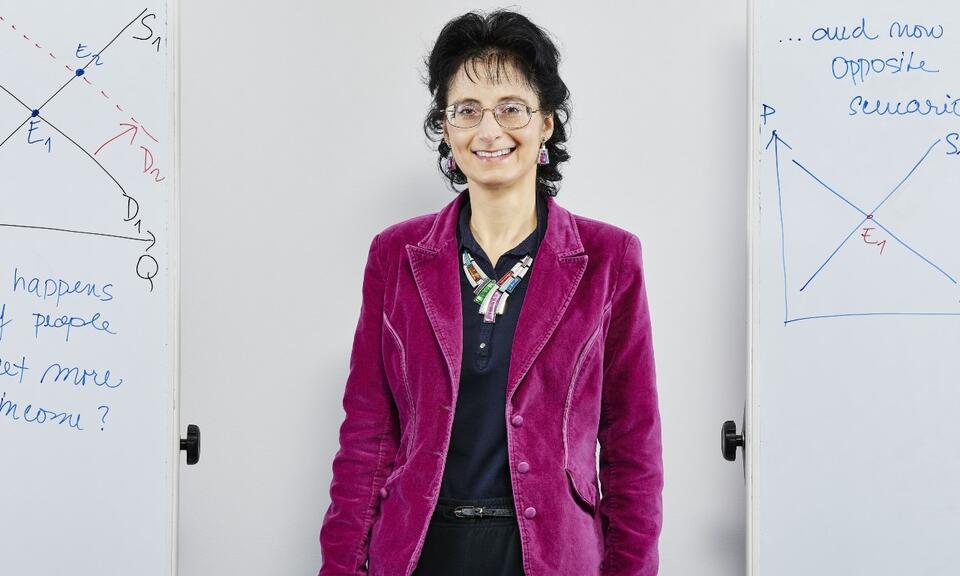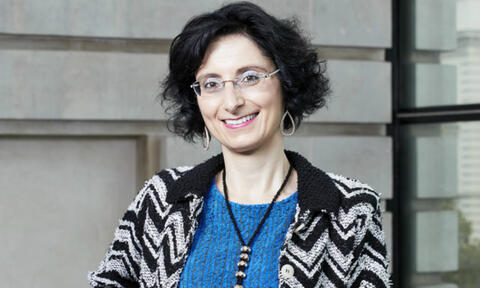
Professor Renáta Kosová tells us about her research in business economics and why it's key for academics to explain the world "beyond abstract principles"
Whether it’s understanding how a fiercely competitive airline sector can shake up a connected industry such as hospitality, or how foreign investment alters homegrown businesses, Professor Renáta Kosová’s research is grounded in the corporate world. She tackles how businesses fare amid rising and falling economic fortunes, market shocks and changing landscapes, and asks if there is an internal structure that helps them survive in the long run.
In the decade she’s spent at Imperial Business School, Professor Kosová has investigated a wide variety of microeconomic questions, from the impact of a minimum wage on businesses’ performance to the corporate consequences of investor optimism during boom years.
“My research focuses on how firms can boost their performance, grow and ultimately thrive in a global marketplace,” she says. Over her career, her focus has shifted from examining how globalisation affects the industrial landscape to the microeconomics affecting a company’s fortunes.
Visibility for female academics
Her promotion in 2023 to Professor of Economics has inspired her and raised her visibility in the academic and business community. “There are not so many senior women within economics. [Promotion] allows you to become involved in leadership roles.” Since becoming a professor, she has taken on the role of College consul – these are academics within Imperial who help ensure academic integrity. “And of course, I’m motivated to continue my research.”
Most recently, she’s looked at the impact of deregulation and increase in competition in the airline sector, and what this does to the hotel trade. And there are spillover benefits among certain strata of hotels, she found – similar to the spillover benefits experienced by domestic Czech firms after foreign funds flowed during the transition to a market economy. This was the subject of her dissertation written as part of her doctoral studies at the University of Michigan and motivated by economic events in her native Slovakia.
Microeconomics gives you a valuable thinking structure – you know where to start looking for the beginning and end
Much of her research uses detailed information from the hospitality sector. Hotels, with their varied ownership and clearly benchmarked signs of quality – from luxury through to economy – can help spot how investments made in boom time fare when the dust settles.
It’s going to be a busy year: she and a colleague are preparing a book looking at franchises, and she has ambitions to become more involved with the International Society of Franchising. She is also busy organising the second launch of the “Theory & Applications of Contracts” conference in cooperation with other colleagues from Imperial, Bristol and the Nobel Prize winner Professor Sir Oliver Hart from Harvard.
Research with impact
Professor Kosová is also enthusiastic about sharing insights from her research with the Business School’s students. “I’m very happy I can teach and incorporate my research to demonstrate the real world beyond abstract principles.”
A knowledge of microeconomics gives students the tools to understand forces behind supply and demand, for example, and the impacts upon companies’ performance, she says. “It’s about what managers do, what entrepreneurs do, and what individuals do. Understanding causality and incentives in economics is one of the most important things. Microeconomics gives you a valuable thinking structure – you know where to start looking for the beginning and end.”
And her future research agenda is crowded. One project draws insights from recent corporate failures within the UK’s fintech market, examining the fragility of trust among investors who have suffered losses. “These results are important for the individual but also for the firm’s performance.” An earlier collaboration with Imperial’s Engineering department has also raised the hopes of investigating the potential impact of automation and robotics in the hospitality sector.
“With promotion comes more demands but I’m happy because I think it’s about giving back – to the academic field, to Imperial and to society.”

